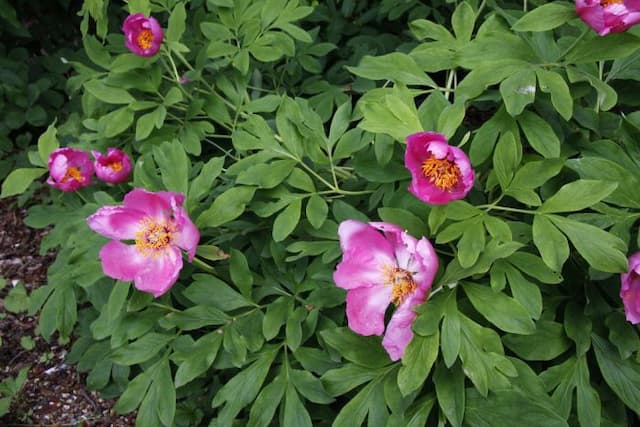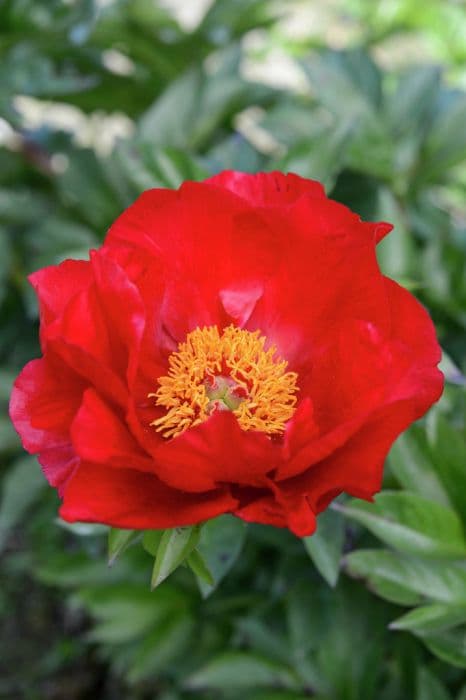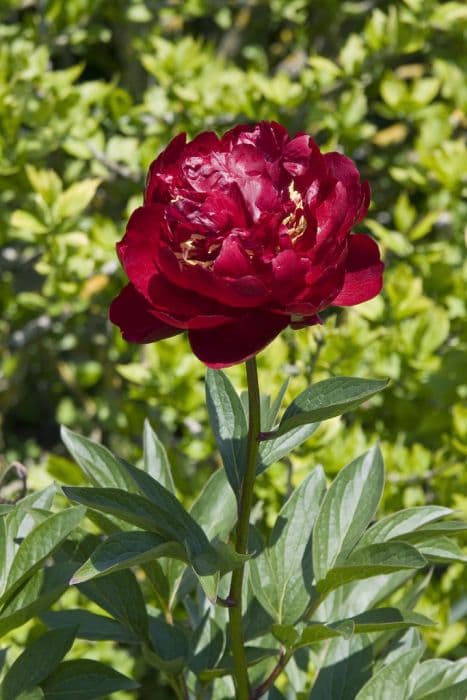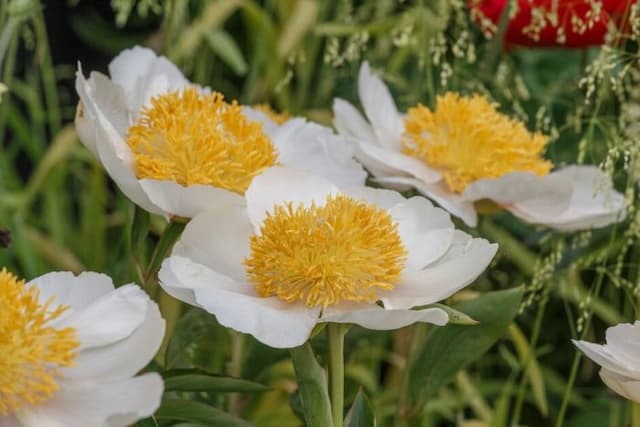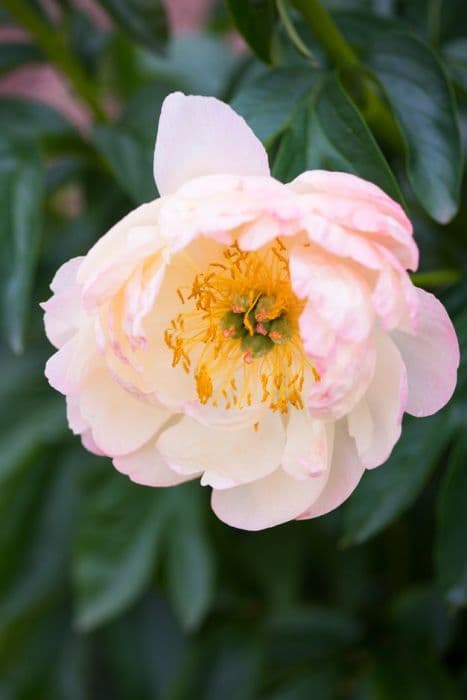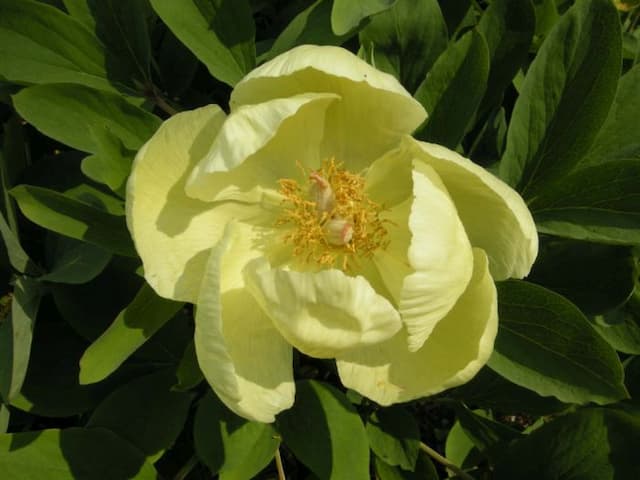Chinese Peony Paeonia lactiflora 'Mother's Choice'

ABOUT
The plant known as 'Mother's Choice' is a variety of peony that is celebrated for its exquisite and showy flowers. The blooms are typically a pure, creamy white with a hint of blush, often appearing iridescent under sunlight. Each flower is densely packed with multiple layers of soft, rounded petals that unfurl elegantly from tight central buds. At the heart of the blossoms, a cluster of golden yellow stamens adds a striking contrast, enriching the visual depth and appeal. The foliage consists of deep green leaves that provide a lush background, highlighting the flowers that perch atop sturdy, upright stems. The leaves themselves have a glossy surface and are divided into sections, with a shape that can be described as lanceolate or somewhat ovate, contributing to the overall lush and healthy appearance of the plant. The peony 'Mother's Choice' exudes a luxurious aesthetic, making it a prized specimen for ornamental gardens. Its appearance is not only beautiful when in bloom, but it also contributes a stately and refined structure to garden settings throughout the growing season.
About this plant
 Names
NamesFamily
Paeoniaceae
Synonyms
Chinese Peony, Common Garden Peony
Common names
Paeonia lactiflora 'Mother's Choice'.
 Toxicity
ToxicityTo humans
Peony (Paeonia lactiflora 'Mother's Choice') is generally considered to be non-toxic to humans. There are no well-documented cases of poisoning from consuming peonies in the medical literature. However, handling peonies can sometimes cause skin irritation in sensitive individuals. It is always advisable to exercise caution and avoid ingesting any plant material if its edibility is uncertain.
To pets
Peony (Paeonia lactiflora 'Mother's Choice') is generally considered to be non-toxic to pets as well. Clinical symptoms of peony poisoning are not well-documented, as it is not commonly known to be a toxic plant to pets. Nonetheless, it's always best to prevent pets from eating plants, as even non-toxic plants can cause gastrointestinal discomfort if ingested in large amounts. If a pet were to ingest peonies and show signs of illness, it is advisable to contact a veterinarian.
 Characteristics
CharacteristicsLife cycle
Perennials
Foliage type
Deciduous
Color of leaves
Green
Flower color
White
Height
2-3 feet (0.6-0.9 meters)
Spread
2-3 feet (0.6-0.9 meters)
Plant type
Herb
Hardiness zones
3-8
Native area
Asia
Benefits
 General Benefits
General Benefits- Ornamental Value: Paeonia lactiflora 'Mother's Choice' is prized for its large, fragrant white flowers which add beauty and elegance to gardens and landscapes.
- Garden Design Versatility: This Peony variety can be used in borders, as a focal point, or incorporated into cottage and formal garden designs due to its structured growth habit.
- Seasonal Interest: With a bloom time in late spring to early summer, it provides a burst of color when many other plants are just beginning to grow.
- Attracts Pollinators: The flowers attract bees and other beneficial insects, supporting local ecosystems and aiding in pollination of surrounding plants.
- Longevity: Peonies are long-lived perennials, with some plants living for over 100 years, making them a lasting addition to any garden.
- Low Maintenance: Once established, Peonies, including 'Mother's Choice,' require minimal care beyond watering and occasional fertilization.
- Cut Flower Use: Flowers from the plant are ideal for bouquets and arrangements, with a vase life of up to a week.
- Cold Tolerance: They are cold-hardy and can survive harsh winters, which makes them suitable for gardens in cooler climates.
 Medical Properties
Medical Properties- Anti-inflammatory: Paeonia lactiflora has been used in traditional medicine for its potential to reduce inflammation.
- Anxiolytic effects: Some compounds isolated from this herb are believed to help in reducing anxiety.
- Immunomodulatory: It may have properties that help modulate the immune system.
- Antioxidant: Contains compounds that might act as antioxidants, helping to protect cells from damage.
- Analgesic properties: It has been used traditionally to relieve pain.
- Antispasmodic: This plant might help alleviate spasms in muscles.
 Air-purifying Qualities
Air-purifying QualitiesThis plant is not specifically known for air purifying qualities.
 Other Uses
Other Uses- Floral Art and Design: The full and double flowers of Peony 'Mother's Choice' make it a prized choice for creating stunning bouquets and floral arrangements.
- Wedding Decor: Owing to its large, lush blooms and sweet fragrance, Peonies are often used in bridal bouquets and wedding venue decorations.
- Photography Subject: The attractiveness of Peony 'Mother's Choice' makes it a popular subject for photographers, especially in the realm of nature and garden photography.
- Eco-friendly Dye: The petals of Peonies can be used to create natural dyes for fabric, offering a soft and less toxic alternative to synthetic dyes.
- Signature Scent Inspiration: The light, pleasant fragrance of Peonies such as 'Mother's Choice' can inspire perfumes and scented oils.
- Artistic Inspiration: The shape and beauty of Peony 'Mother's Choice' are often used by artists as a muse for paintings and illustrations.
- Culinary Garnish: While not as a common practice and ensuring edibility, Peony petals can sometimes be used sparingly as an ornamental garnish in high-end culinary presentations.
- Focus in Horticultural Shows: Peonies like 'Mother's Choice' are often featured in flower and garden shows, attracting attention due to their stunning appearance.
- Cultural Symbol: In many cultures, Peonies symbolize happiness, prosperity, and romance, and are used in various ceremonies and traditions to represent these ideals.
- Crafting Supplies: Dried Peony petals can be used in the making of potpourri, or incorporated into paper-making for an artistic touch in handmade crafts.
Interesting Facts
 Feng Shui
Feng ShuiPeony is often used in Feng Shui to promote love and romance, and it is typically placed in the southwest corner of a garden or room to enhance these aspects of life.
 Zodiac Sign Compitability
Zodiac Sign CompitabilityThe peony is not used in astrology practice.
 Plant Symbolism
Plant Symbolism- Beauty: Paeonia lactiflora, commonly known as the Chinese Peony, is often associated with beauty due to its large, full blooms and rich colors.
- Prosperity: In many cultures, peonies symbolize prosperity because of their lush and opulent appearance.
- Honor: The peony is regarded as a symbol of honor and high social status, particularly in Chinese culture where it is considered the "king of flowers."
- Romance and Love: The Chinese Peony is often used in weddings and romantically associated arrangements to signify love and affection between partners.
- Good Fortune: The flower's lush appearance and connections to nobility lead to its symbolism of good luck and fortune, making it a common gift for celebrations.
- Femininity: With its soft, rounded petals, the peony can represent the idealized qualities of feminine beauty and gentleness.
- Compassion: The nurturing aspect attributed to mothers could be associated with 'Mother's Choice' specifically, representing caring and nurturing characteristics.
 Water
WaterThe common Peony 'Mother's Choice' should be watered deeply and thoroughly once a week, or more frequently during periods of extreme heat or drought, ensuring the soil stays consistently moist but not waterlogged. You will want to aim for around 1 inch of water weekly which can be roughly translated to about 0.6 gallons for an average-sized plant. During the growing season in the spring and early summer, this may mean watering a couple of times per week if rainfall is insufficient. It is essential to avoid overhead watering to minimize the risk of fungal diseases—focus on watering at the soil level.
 Light
LightPeonies like 'Mother's Choice' thrive in full sun, requiring at least 6 hours of direct sunlight per day to bloom properly. Plant them in a spot that gets unobstructed morning light and some afternoon shade in hotter climates. Avoid placing them in deep shade, as this will significantly reduce blooming and can lead to weak and leggy stems.
 Temperature
TemperaturePeonies such as 'Mother's Choice' prefer temperate climates and are quite cold hardy, tolerating winter temperatures down to about -20 degrees Fahrenheit. They typically require a chilling period of winter cold to thrive and set buds. The ideal growing temperatures for Peonies are between 65 and 75 degrees Fahrenheit, but they can survive summer highs up to the lower 90s.
 Pruning
PruningFor the common Peony 'Mother's Choice', prune to remove spent flowers immediately after blooming to maintain a neat appearance and prevent seed formation, which can divert energy from the plant. In the fall, after the first frost, cut the foliage back to the ground to prevent overwintering of diseases. Peonies don't require frequent pruning; once a year is generally sufficient.
 Cleaning
CleaningAs needed
 Soil
SoilPeony 'Mother's Choice' thrives in well-drained, fertile loamy soil with a pH of 6.0 to 7.0. A mix incorporating two-thirds garden soil and one-third compost or well-rotted manure is ideal, ensuring rich organic content for optimal growth.
 Repotting
RepottingPeonies like 'Mother's Choice' seldom need repotting as they prefer to be left undisturbed. They can stay in the same spot for 10 to 15 years if the soil is healthy and they are performing well.
 Humidity & Misting
Humidity & MistingPeonies such as 'Mother's Choice' are tolerant of a wide range of humidity levels and do not require specific humidity conditions to thrive as long as their soil moisture needs are met.
 Suitable locations
Suitable locationsIndoor
Not ideal indoors; requires deep planting and chilling for blooms.
Outdoor
Plant in full sun, well-drained soil, and space 3 feet apart.
Hardiness zone
3-8 USDA
 Life cycle
Life cycleThe common name for Paeonia lactiflora 'Mother's Choice' is Garden Peony. Its life begins with seed germination, usually requiring a period of stratification to break dormancy. The young seedling grows into a perennial herbaceous plant, forming a clump of leaves that die back each winter after establishing a root system. In spring, new shoots emerge from the rootstock, developing compound leaves and large, fragrant flowers typically blooming in late spring to early summer. After pollination, often by insects attracted to its scent and color, it produces follicles containing seeds that mature by late summer. The plant then enters a period of dormancy again as the foliage dies back with the onset of autumn, storing energy in the roots for the next growing season.
 Propogation
PropogationPropogation time
Spring-Early Summer
Paeonia lactiflora 'Mother's Choice', commonly known as peony, is best propagated through division. This process is ideally done in the fall, after the plants have gone dormant. To propagate by division, carefully dig around and lift the peony's tuberous roots from the ground, making sure to keep a generous amount of soil around them. Each division should have at least three to five eyes, which are the small reddish buds from where new shoots will emerge. Gently separate the roots with a sharp knife if necessary, and replant the divisions promptly, positioning the eyes about 2 inches (approximately 5 centimeters) below the soil surface to promote optimal growth the following spring. Water the newly planted divisions well to help establish them.
